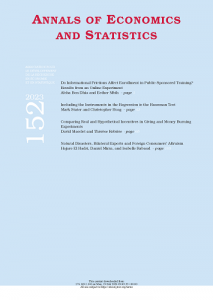
We study a dynamic model of common-pool resource management in which agents have different (mis)perceptions about the probability of a regime shift. We show that differences in risk misperceptions and the pre-and post-shift resource quality levels have a first-order effect on the noncooperative policy. Regarding the efficiency benchmarks, these differences have no effect on the cooperative solution under a paternalistic social planner. However, they do have a first-order effect on the populist cooperative solution, even when agents are on average unbiased. A tragedy of the commons problem arises at the aggregate population level, but not at all sub-population levels. From the point of view of policy instruments, a uniform quota policy would be optimal, while either a uniform or a differentiated tax policy would not be.
Finally, policies aimed at correcting misperceptions have an ambiguous effect on welfare as it depends on certain characteristics (resource quality levels, population structure).
